#that something is internationalism and class war
Note
What might decolonization in the US after a successful socialist revolution look like? Would there be one big government still? A sort of union of socialist republics? Something else entirely? Honestly I don't know how to ask.
Post-revolutionary decolonization (and realistically, the only kind of meaningful decolonization that is ever happening) in the US is a complicated matter given the relative success of the USAmerican genocidal project. The native population is 1.1% of the total population as of the 2020 census, this means that unlike in other, incomplete, settler projects such as the Sahrawi Republic or Palestine, it isn't feasible to restore the relation of the native population to the totality of the country. Regardless of population proportions though, the main focus of socialist decolonization is the struggle against any conflict between nationalities by removing the economic basis of that antagonism, which would then allow to also begin to remove the cultural elements that reinforced that dynamic of oppression. The focus is not to create more landlords but native, it's to remove the structure around private property in general, and make sure every worker, native or otherwise, receives as is needed. Taking into account the already relative dispossession of native people even before a pre-revolution context, there will have to be a great effort to bring the conditions of native people at the same level of non-native people.
Regarding the form of the new state, this will evidently depend on the form of the US state as the revolution happens. In other countries this would not be such a pressing question, but given the role and strength of the USAmerican bourgeoisie, it's not hard to believe that for any revolution to take place, the US state would need to be considerably weakened. Keeping this in mind, the strategy followed by all hitherto socialist revolutions is to not further fragment the new state. Given the complexity of navigating the construction of the first elements of a socialist economy, with the simultaneous effort needed for security, it would be both counterproductive and hypocritical to explicitly seek the independence of a portion of the population, as a part of the political program, it would be taking two steps forward and one step back. The communist revolution is national in form, because it happens within the structure of the capitalist state, but it is also international in content, because it explicitly repudiates the division of the proletariat along national lines.
We must understand that nationality, as much as it is relevant today and as much as it influences the course of history, is a byproduct of the development of capitalism, and that since it arose from the infrastructure to justify and protect it, it will also have to seize to exist and be replaced with proletarian internationalism for the duration of the transition to socialism-communism. Keeping this in mind, it would be hypocritical and regressive to, after taking control of the state and beginning the transition away from capitalism, to then turn around and divide the working class of the new country into even more national categories than they already are divided into.
The early USSR is a good comparison because of the sheer quantity of national diversity contained within the bounds of the corpse of the Tsarist Empire. The policy of the bolsheviks was neither of Russian supremacy or of immediate splintering into hundreds of nation states. Even during the very complicated and desperate context of the civil war, Finland was allowed its independence without much fuss from the CC, even if they were immediately incorporated into the German sphere via Von Mannerheim. When the 1936 constitution was being discussed, it was Stalin himself who went against the wishes of many bolsheviks to prevent the republics from gaining independence if they wished. No republics requested this however, because the oppressive mechanisms of capitalism and feudalism that had kept them under the Tsar's thumb for centuries had been replaced with an economic system that assured the equal development of all peoples within the USSR. The USSR itself was also not absolutely centralist, and the many constituent republics had varying degrees of autonomy, reflecting in some aspects the structure of democratic centralism.
I don't think the answer is to replicate the USSR, of course. The context and general state of things are very different, but there are lessons to be learnt from this successful, albeit flawed, tackling of the national question. Again though, we can't really speculate on the way that the US will look right before a revolution, and consequently the structures and problems a revolutionary government will have to start from.
175 notes
·
View notes
Note
What was one of your favorite experiences when living in japan? Would you ever go back to visit or live there again? How did you go about moving there in the first place, were you part of a program or get accepted to a university there? (just curious. I think it's interesting to learn about other cultures but 10+ years on tumblr has rotted my brain a little to make me worry about crossing a line into like... cultural appropriation somehow even just by asking? When you lived there i imagine it was really lax and people were happy to share their culture, right?)
Visiting a small primary school up in the mountains and sitting with the kids, as well as other members of my class who came from all over the world, and explaining what we learned in school about World War II. Hearing how the narrative shifted when taught by different countries curriculum was a very enlightening experience, not because of what I learned about WWII, but because of what that taught me about internationalism.
I plan on moving back to Japan in the next 5 years.
I was not in any program, my schooling stopped in highschool when I dropped out halfway through my junior year, and then 3 years later I applied to one university (Doshisha) and was accepted.
From when I was 8 to when I was 16 I wouldn't ever let myself watch anime. I was so extremely interested in Japan, and I was horrified that if I ever watched anime and anyone found out they'd reduce my interest to being a weeaboo and nobody would ever take me seriously, and that thought was terrifying to me. The idea that nobody would ever listen to me talk about something I loved was an isolating concept, and so I staunchly refused to watch it.
And then one day, while I was down at the barn refilling a bucket of water for the horses to drink out of, a though occurred to me:
"Wait a minute. Anime is just cartoons. Why can't I watch cartoons?"
Enjoying another culture is not cultural appropriation. Cultural appropriation is taking culture that is not meant to be taken lightly and bastardizing it. Fetishization is when you put certain cultures onto pedestals.
Being fascinated in a culture means doing your best to understand and appreciate the human element of it. In the fetishization of cultures we tend to see, the humanity is sucked out of it, and that creates two things:
The product, which is the misrendered perception of the culture.
The "Other", which is the people of that culture who have been turned from humans to characters for the fetishizer to gawk at.
Please, with all of your heart, love cultures. Be fascinated with people who are dissimilar to you, or even grow more interested in your own culture! Just do your best to love the brightest parts of humanity every day.
842 notes
·
View notes
Note
Yo! I’ve been developing my class conscience a good deal in the past year, I think I’ve gotten a decent understanding of different economic systems and the horrors if imperialism and ways to combat that. Something I’m very uneducated on is china and if it’s “good” or not. It’s not your job to do this but could you give me the rundown on chinas role in global communism? Are their efforts truly beneficial to the modern proletariat? Thank you for your time much love ❤️
sure! thx for asking.
the PRC is a socialist state, i.e. a dictatorship of the proletariat, that follows marxist-leninist principles, such as internationalism, dialectical materialism, a strong connection to the working classes, etc. it was formed after several decades of a protracted people's war with the former republic of china and Kuomintang, with the aid of the ussr. Pre-revolution, however, it was semi-feudal, poor, and otherwise backwards economically, also meaning that the proletariat as a class was underdeveloped.
to build the proletariat, increase capital, build a broad industrial base, etc., the policy of state capitalism was determined to be the only way forward, with the experience of the USSR and materialist analysis. state capitalism utilizes the benefits of the development of capitalism, such as socialized production, desperately needed capital, the building of factories, etc., while still maintaining itself as a proletarian state, and controlling the bourgeois. state capitalism, as i stated in the first draft of my essay (shameless self plug), is not a defined economic mode such as capitalism or socialism, it is simply a set of policies to be executed by a socialist state. its niche is in general modernization of tech, production, etc., and especially of the proletarian class. the reason it is used by semi-feudal countries is for that purpose, and a socialist state with an already developed proletariat, i.e. one in which capitalism has been allowed to fully develop, would not have much use for it.
State capitalism in the PRC consists of multiple things, namely a sort of "allyship" between private enterprises and the state, which Chairman Mao Tse-tung goes into in great detail in this, which i highly reccomend.
The policy allowed the construction of their extremely powerful industrial base, and with it public health, a developed class structure, the flourishing of the cultures of minority nationalities, its disciplined and valiant PLA, and the ability to resist imperialist intervention.
It has been working to build a united front against western imperialism, it provides massive humanitarian aid to periphery countries, has powerful allyships, etc. for these reasons, it is currently the vanguard of proletarian struggle worldwide.
Of course, it does have its flaws, most of which will be immediately rectified via demcent and contact with the masses, some of which were the "growing pains" of the new socialist state, and some of which were genuine errors. but above all, it is a marxist-leninist internationalist DotP.
13 notes
·
View notes
Note
Hi idk if anyone has asked this before but do you think there are thematic implications to Sangah liking works from Murakami Haruki, Raymond Carver, Han Kang.
Yeah, I'm not super familiar with all of the authors myself but I did some basic research while writing Wall fic so I have an opinion about this. First of all, the internationality of these picks shows YSA is well read, but this different kind of well read than KDJ. Her interest in international literature is somewhat connected to her backstory of being from a richer family that wanted to marry her off in my mind bc international language education is somewhat status/wealth associated in modern South Korea. Second of all the kinds of authors she picks out are the type who write singular, artistic works that tend to start from a point of realism and make a comment about the characters' navigation of Society. So the type of reading she's doing isn't sitting down and obsessively following a 3000 chapter webnovel that can only exist through the conglomeration of niche trope after niche trope to be completely understood. I see her as a girlie who like. Will check the new York times best seller list and just buy or check out a new book to read if she hears good things. So this authors of singular works and short stories being her favorite shows she doesn't really follow extensive Series, she's not the type who needs constant updates to keep on living lol. She's the type who occasionally read novels for literature classes which graduated to occasionally reading novels in her free time. Not saying that she reads popular novels just to seem cultured like mister 'art of war on my desk' but I think she is someone who can see opening a book like stumbling upon a television program that just happens to be on you know it's not a major time commitment or something that will rewire her brain and then she'll have thoughts about language use and literary opinions you know.
Then the one author I'm more familiar with is Han Kang and I actually didn't remember her being listed by YSA but you're probably right and I just forgot bc I know Han Kang from reading the Vegetarian more than I know her from being referenced in ORV I guess lol. Han Kang is a popular modern author in South Korea who has both been somewhat of an icon for feminism (I think?) And is definitely a representative of the Trauma literature movement. She grew up in Gwangju and lived through the aftermath of the Gwangju uprising (the people suffered violent oppression and censorship under leadership at the time) and in an interview she once described herself as someone who writes to ask questions instead of answer them. The Vegetarian is an example of a work of hers that starts off very ingrained in reality and slowly becomes surreal in a way that could still exist in the real world but could be interpreted as containing fantasy elements. I think it's interesting to me to draw parallels to YSA here bc the vegetarian is a story about a traumatized woman being controlled and used by other people. Spoilers for the vegetarian I guess but the main character decides to be vegetarian one day without a 'societally acceptable' reason and this 'embarrasses' the people around her so much that they try to force her to change. After she is abused by her husband, father, and brother in law, this experience is held parallel to something she experienced as a child, when she was friends with a small dog and then the dog bit her. Local folk medicine said killing and eating the dog was the only way to cure sickness from a dog bite and she felt no remorse as everyone agreed the dog must be eaten. Forgetting 'the natural order' revokes the rights of personhood or humanity, when the main character of the Vegetarian descends into a psychosis trying to escape participating in the violence of the world around her by 'becoming a plant,' it's shown at the end how even her own sister struggles to see her as a person who can still be spoken with or make her own decisions. So yeah it's pretty fucked up and I have some more specific opinions on it ( like I've written essays about it) but as it relates to YSA the Vegetarian is very much about the POV of outsiders following another person's struggles which I find a very interesting in parallel to YSA leafing through KDJ's memories as his wall librarian. I also think her familiarity with trauma literature as a genre may be off-putting to KDJ specifically because these realistic type stories with a bit of fiction are quite similar in genre to the book his own mother wrote, in fact I find it extremely likely that in the world of ORV YSA read LSK's book somewhere before. I think they're also not the kind of books that get overly silly/ have a 'happy ending' by convention, which is interesting to me bc I see passivity vs agency as an important theme concerning YSA's arc throughout the story and whether or not she has an ability to create a happy ending or not is interesting. Like the little 'you knew??' moment in the epilogues is very important bc YSA and KDJ come from this same 'real world' and because of that neither of them really expected a Happy Ending you know. I like that YSA goes through the journey of beginning to Believe in it before KDJ comes back bc you know it shows that perspective can be changed before we even get to him it's really good.
28 notes
·
View notes
Text
Sebastián Piñera, criminal internationally known for been the president of Chile two times as well for been a clown, is death and all over the world, but especially in Chile, his image is gonna be wash of all the blood. He not only robbed a bank and was a fugitive, he also was corrupt as fuck and did money laundry, scammed, trafficked babies, children and teens for upper class adoption from foreign europeans, gringos and other places, but also for sexual abuse as well for Organ Trafficking, he even had as his right hand an "ex" mossad agent, Hinzpeter who helped him to bring literal tons of cocaine to the country and then keep the traffic and micro traffic working and use south american emigrants that were in extreme poverty to traffic so then he could blame them of been the responsables of the huge drug addictions and narco violence here. He also allowed false flag terrorism to keep the occupation of Mapuche territory, their killings and stealing of lands and resources. Between his political assassinations we can count beloved upper class TV face and show host Felipe Camiroaga, who had said on TV during student protests movement (for food on schools and free education and stop the corruption at educational institutions) that if the youth was protesting, Piñera had the obligation to hear them bc the people was right and was his duty as president. Under Piñera's orders Hinzpeter killed Camiroaga with other 20 people on board of an helicopter, a C-212 Aviocar of the Chile's Air Force, that was heading to help people of the Robinson Crusoe Island in the Juan Fernández Archipelago because the destruction cause by the infamous 2010's massive earthquake that moved the Earth from her axis. Piñera even let Hinzpeter to inform the crime as an accident and this fucked even paraphrased in the live media TV and radio the words that Camiroaga said to Piñera on his program calling him to be a good president, putting together phrases to mock and refer to his death.
And if u think that he already was a monster for this, let me tell u that in Octuber 18th of 2019 and the next months se did a dictatorship in which he declared on national transmission that the state (he) was in war against the people (who were literally just people, civilians all with no weapons bc here we dont own weapons), and the military and police went to the street and houses to kill. The motive Piñera had to begin this? That school teens evaded the payment in the subway as a form of protest for the constant rise of the ticket price in a country in which most of us are poor and the using transportation for 1 month cost at least 1/3 of the minimum wage.
They police and the military murdered, wounded and did systematic mutilation and torture as psychological warfare learned by training with Israeli military and mossad. They practiced beforehand shooting to students in the university of professors here, they (as always) go inside with no order nor justification to shoot us with shotguns to the face with war weapons like teargas cans and special bullets. Piñera sent the police and military to pillaged the supermarkets and burn them and blame the people and the left, they even use the burning buildings to hide the corpses of people they killed, probably there were alive ppl too. They tortured, raped and mutilated people not just in their police and military quarters, they also used underground stations/subway stations as torture houses, something that they are familiar with bc Pinochet's dictatorship. The Piñera dictatorship had never been called dictatorship in anyplace, specially in the TV bc he and all his family and friends own the media (all the TV channels and 99% of news paper like El Mercurio, La Nación, Las últimas Noticias, The Clinic, etc etc). We still have Disappeared detainees and they are not recognised as such, and also not every torture survivors is recognised as such, we have tons of people that lost their ocular globes partially in sight, totally, or the globe was totally destroyed and they are not recognised as victims of the genocide attempt. Piñera wasn't destitute as president, he didn't even faced justice, nor the national justice nor the international one, even when there was hundreds of pictures, videos, audios and other evidences of his crimes, he wasn't even called criminal, dictator or anything. He was accused of Crimes against Humanity and yet national and international law did NOTHING. His crimes in Chile were so many that representative (diputado) Jaime Naranjo read 1300 pages of some of Piñera's crimes for 15 hours straight and had a full live streaming.
So when your media and journalist tell you that Piñera was a good president, please remember this post (that don't even have all his crimes nor in detail) and remember that he was a monster that die without a thing to worry about in his life that face zero justice and that all the world let him go out scot-free. Don't belive in news nor even in chileans or other south americans that tell you that Piñera was good and that "the left" were terrorists and shit like that bc we here barely have something like a left wing and even if we had, no one did a shit to stopped the massacre.
Don't believe that Chile and Piñera are lovely, here is just full of blood thanks to right wing and the stupidly of the left and the liberal bourgeoisie.
Likes don't help to spread this post, ppl. REBLOG IT FOR FUCK SAKE
And if u are a boot licker the the fuck out of my blog and if u comment some bullshit I'm gonna block u and report u. Fascists, specially chilean fascists DNI.
#piñera#sebastian piñera#chile#politic#justice#justicia#crimenes de lesa humanidad#war crimes#crimes against humanity#latam tag#terrorism#signal boost#shot of stress
20 notes
·
View notes
Text
Anarchist Zines and Pamphlets Published in July 2023

Welcome to our mostly monthly round-up of new zines published in the anarchist space. We aim to highlight a broad range of anarchist thought. Inclusion here doesn't imply endorsement.
You can view past round-ups if you want more reading material. If you have something you want us to include next month, contact us. For a curated collection of zines, view our catalog.
Beyond what you can find here, we also recommend you support anarchist print media. Two recently released print projects include Plastic in Utero: a journal of anti-civ anarchy reborn from the compost of wasteland modernity #1 and Rupture Mag #1
The image accompanying this post is memorial mural in Lyon, France for Carlo Giuliani, a 23 year-old anarchist who was shot dead by police on July 20, 2001 during the anti-G8 protests in Genoa, Italy (source)
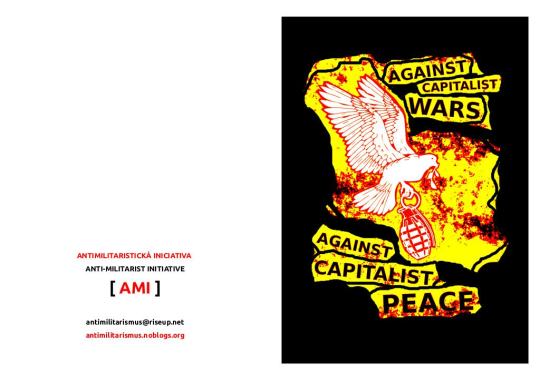
Against Capitalist Wars, Against Capitalist Peace
"In Ukraine, the Czech Republic, the UK, Italy, Syria, France etc… All over the world there is a voice against capitalist wars and also against capitalist peace. Only class war can end this terror and that is what we mean when we say No War but the Class War!
The new pamphlet contains 14 texts by various groups and individuals. The aim is to explain and affirm the meaning of antimilitarism, internationalism and revolutionary defeatism."
Download PDF: [ Imposed | Screen ]

Animal Bodies, Colonial Subjects: (Re)Locating Animality in Decolonial Thought
"Similar to the ways in which Indigenous peoples can undergo a violent process through which we rid our colonial mentalities, I argue that animals can be liberated from their colonized subjecthood through an aided 'process of desubjectification'. That is, thinking through animality as an infrastructure of decolonization re-positions animal bodies as agents of anti-colonial resurgence.They can consequently engender 'forms of energy that are capable of engaging the forces that keep [Indigenous people and animals] tied to [a] colonial mentality and reality'. Settler colonialism has therefore required the normalization of speciesism within Indigenous communities to obfuscate the radicality of Indigenous-animal relations. In that sense, recalling the representation of animals in Indigenous cosmologies/oral traditions and unsettling speciesism as a 'colonial mentality' must be prioritized in decolonial thought..."
Download PDF: [ Imposed ]

Black Flag Vol. 3, No. 2
This issue features a lenghty essay titled "Anarchy in the USA: The International Working People's Association (IWPA)". The IWPA is famous for its association with the Haymarket anarchists. Alongside this, there are several writings published by members including Albert Parsons and Lizzie Swank. It also includes a selection of writings by Marie Goldsmith, Rudolf Rocker, and Max Baginski. Most of the material here covers the historical anarchist space, with the exception of a review of a more recent book.
Download PDF: [ Imposed | Screen ]
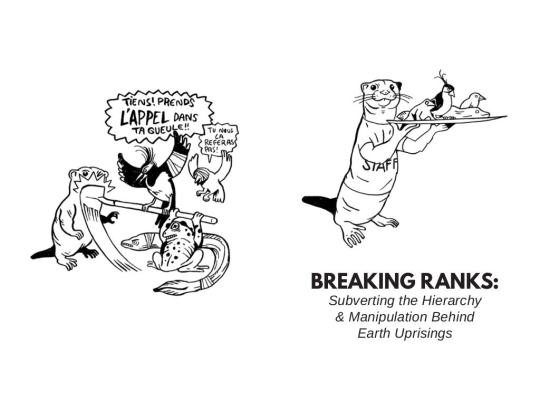
Breaking Ranks: Subverting the Hierarchy and Manipulation Behind Earth Uprisings
This zine contains three critiques from anti-authoritarians in France critical of the Tiqqunists and their actions in post-ZAD struggles. These texts focus on manipulative and vanguardist practices, the spectacularization of the struggle, and the use of radicals as shock-troops. The goal of these texts, and our translation effort, is to increase familiarity with these deceptive practices and strategies, an essential first step towards sabotaging the influence and control of any similar attempts in our own neck of the woods.
Download PDF: [ Imposed | Screen ]
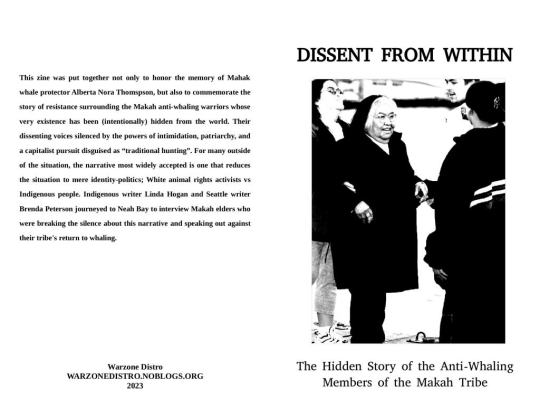
Dissent From Within: The Hidden Story of the Anti-Whaling Members of the Makah Tribe
This zine was put together not only to honor the memory of Mahak whale protector Alberta Nora Thomspson, but also to commemorate the story of resistance surrounding the Makah anti-whaling warriors whose very existence has been (intentionally) hidden from the world. Their dissenting voices silenced by the powers of intimidation, patriarchy, and a capitalist pursuit disguised as "traditional hunting". For many outside of the situation, the narrative most widely accepted is one that reduces the situation to mere identity politics; White animal rights activists vs Indigenous people. Indigenous writer Linda Hogan and Seattle writer Brenda Peterson journeyed to Neah Bay to interview Makah elders who were breaking the silence about this narrative and speaking out against their tribe’s return to whaling.
Download PDF: [ Imposed ]

How to Set Up a Burner Phone
This zine is a step-by-step guide to setting up a burner phone, from purchasing the phone to installing recommended apps -- all without a Google account! If you are interested in using a temporary phone to avoid surveillance or hinder a police investigation, this zine will give you some best practices to consider.
Download PDF: [ Imposed | Screen ]
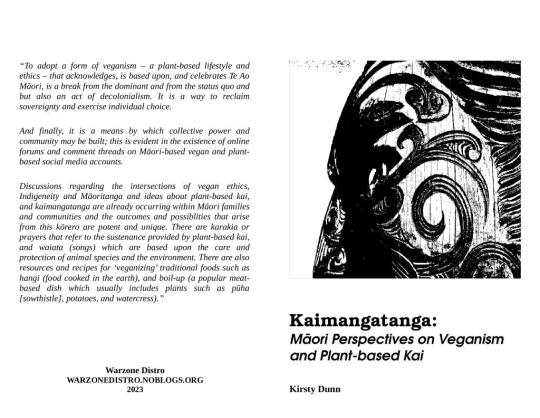
Kaimangatanga: MÄori Perspectives on Veganism and Plant-based Kai
"To adopt a form of veganism -- a plant-based lifestyle and ethics -- that acknowledges, is based upon, and celebrates Te Ao Maori, is a break from the dominant and from the status quo and but also an act of decolonialism. It is a way to reclaim sovereignty and exercise individual choice.
And finally, it is a means by which collective power and community may be built; this is evident in the existence of online forums and comment threads on Maori-based vegan and plant- based social media accounts."
Download PDF: [ Imposed ]

Living in an Earthquake: The Fight Against Cop City Confronts Unprecedented Repression
"In the following account and analysis, participants in the movement in Atlanta trace its trajectory from the fifth Week of Action that began on March 4, 2023 through the City Council vote of June 5.
At first, it appeared to be an ordinary forest defense campaign aimed at discouraging Atlanta city government from pouring money into an unpopular police training facility. But over the past two years, the fight against Cop City has escalated into one of the fiercest struggles of the Biden era, pitting a wide range of courageous people against a united front of politicians, prosecutors, and police.
In setting out to stop the militarization of police, activists have discovered that they are challenging the state on a point that all of its representatives consider non-negotiable. Police and prosecutors have pressed trumped-up domestic terrorism charges against almost every defendant arrested since last December; they have killed one forest defender; they have charged those engaged in legal support for the arrestees."
Download PDF: [ Imposed ]

Of Diets and Morality: A Vegan Egoist Perspective
The title summarizes this well. It's a vegan egoist text that argues for seeing animals as having inherent value. A quote:
"Animals can offer me many things that other "humans" can not; new ways of communicating, of perceiving the world around me; the unique, aesthetic pleasure of their appearance, especially the details that one only notices with familiarity, and the mystery, intrigue and exciting unexpectedness of beings so morphologically and genetically different from myself! Just as a plate with greater variety is far more delicious, relationships with a greater diversity of beings is far more delectable for me and I will not limit myself to consuming only relations with Man!"
Download PDF: [ Imposed ]
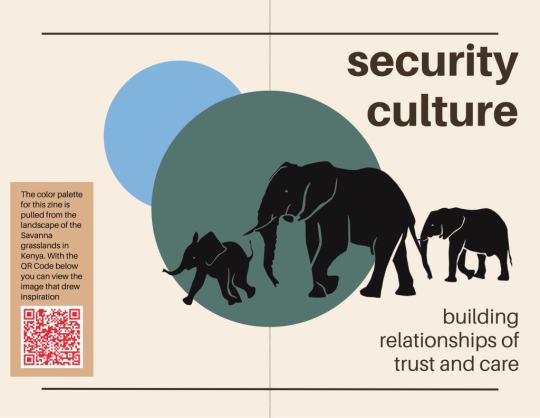
Security Culture: Building Relationships of Trust and Care
These zine provides an accessible introduction to security culture and its place in social movements. Beyond the basics, it explores how security culture can be informed by kinship, an Indigenous value system based on responsibility, vulnerability, trust, and reciprocity. The zine also offers tips and examples on how to apply critical thinking, relationship building, communication, and feedback to security culture. It uses elephants as a motif (complete with illustrations) to reinforce the concepts presented.
Download PDF: [ Imposed | Screen ]

The People and the Library
"An oral history of the coalition that united Philadelphia to challenge the logic of austerity, protect public goods and save eleven branch libraries, as well as a series of reflections on the importance of the commons, the enduring legacy of movement victories and the ongoing struggles to protect and expand access to non-commercialized public space, accompanied by a series of freely reproducible cut paper graphics by Erik Ruin.
Download PDF: [ Imposed | Screen ]

The War in Front of Us: An anonymous, afro-pessimist militant’s challenge to the Stop Cop City movement
"There is a tension stewing right now, not simply between differing tactics but with the outright acceptance of the position we are currently in, that of a social war. The third day-long descent on the Atlanta City Council has again hammered home that legalistic attacks and appeals to the political machine are going to keep failing. Despite that being so overwhelmingly evident, the more progressive-inclined elements of the struggle continue to insist upon a peaceful endurance, one that refuses escalation and actual conflict for their safe, faux-rad- ical abolitionism. We have been locked in this social war since the rebellion and the terrain needs to be read as such."
Download PDF: [ Imposed ]

Veganism and Mi'kmaw Legends
"This text proposes a postcolonial ecofeminist reading of Mi'kmaw legends as the basis for a vegan diet rooted in Indigenous culture. I refer primarily to veganism throughout this work because unlike vegetarianism, it is not only a diet but a lifestyle that, for ethical reasons, eschews the use of animal products. Constructing an Indigenous veganism faces two significant barriers--the first being the association of veganism with whiteness... ...A second barrier to Indigenous veganism is the portrayal of veganism as a product of class privilege."
Download PDF: [ Imposed ]

Veganism as Anti-Colonial-Praxis: A Collection of Indigenous Vegan Perspectives
"Despite the absorption of veganism by the capitalist market – a process that admittingly reinforces pre-existing divisions across class and racial lines -- a vegan lifestyle taken to its logical conclusion is fundamentally anti-capitalist and anti-colonial. By (re)acknowledging sentience and personalities within the bodies of colonized (animal) subjects, a vegan lifestyle rejects authoritarian relationships based on disrespect for the bodily autonomy of those whose lives have been re-purposed for human supremacist consumption."
Download PDF: [ Imposed ]
52 notes
·
View notes
Note
Hyrmmmmmm
I give you a choice. (Sorry for destroying the executive function outsourcing)
In order of my esteemed preference (lol)
1. Grimlands
2. Codlands
3. Crystal Cliffs
(I give choice, because idk what you have fleshed out hhhhhhhh)
(you certainly don't have to do all 3, not all at once, not for me. {Unless you want to})
Curses! Foiled again!
I'll do all three, but the Codlands and Crystal Cliffs will get different posts and will probably not be tonight.
Also a general note relevant to the succession criteria of the majority of the empires. Remember this whole thing, where Pix kind of accidentally changed the formal definition of war in the empires? That had a lot of implications for how royalty functioned in the Empires. While they still absolutely have internal duties and responsibilities and privileges, ultimately their most important job is that they stand ready to defend their empire and its people at all times. Part of this is that they also function as international ambassadors in a way, while most empires also have official ambassadors, the relationships and interactions between the emperors themselves are a very important (sometimes volatile) facet of international relations.
An country cannot be recognized internationally as an autonomous nation without an official Emperor/Head of State. The exception to this is the neutral territory of Mangrovia, which is small and rather isolated and basically exists due to several specific treaties granting it the ability to be independent and guaranteeing it immunity from conflict. So far this has not been put to the test.
So, the Grimlands!
The Grimlands is one of the empires that is primarily human. They do have a hybrid population, as well as some (human and hybrid) who have Other Ancestry mixed in there. (Gem has antlers, for example :) ) But they would be considered a Mortal Kingdom.
They do not have a singular royal family, rather they have a noble class from which the emperor is chosen, based off a combined consideration of the council (made up of a representative from each family, yes that gets as politically fraught as you would imagine, and the alchemical and engineering guilds), and a series of (hypothetically) more objective criteria, mostly combat based.
When the Count/Countess of the Grimland's either dies or abdicates, there is a grace period of three months for the council to choose their successor. In cases of abdication, the retiring ruler is allowed to present recommendations and to vote in the final decision. (Several have abdicated specifically so they could choose their successor. In these cases 3 times out of 4 their candidate is the one chosen)
Obviously over the centuries the quality of objectiveness has varied, based on the um, personal integrity of the individuals in power at the time. There have been some highs and lows.
Fwhip was selected at something of a young age, partly based on merit, and partly because relationships with Mythland were somewhat tense at the time of the previous Count's death. And Fwhip was the cousin of the young, newly crowned king of Mythland. (His father married into his mother's house from the royal family of Mythland.) Gem had also just won the title of (youngest ever) High Wizard of the Crystal Cliffs, and her close bond with Fwhip (and Sausage) had basically been Fwhip's family's "dirty little secret" when they were kids.
Technically they are second cousins, but they did actually grow up as friends and were very close, and it was decided that between his prowess with both alchemy and redstone and the close ties this would allow with Mythland (which though distant geographically controlled several resources vital to the Grimland's prosperity) and the Crystal Cliffs (their closest neighbor and a magical powerhouse) it was enough to override that he was not the strongest combatant of the candidates, though he was one of the best.
Fwhip, who had a tendency to get lost in his adventures and redstone experiments of questionable ethical standards, was honestly completely oblivious to being one of the finalists. Between his age and rankings in combat, he did not seriously consider the likelihood he would be chosen until he was pulled out of his lab to go stand before the council and be named Count of the Grimlands.
It was a bit of a stressful time for Fwhip.
He, Sausage, and Gem got even closer during that time, and that was when he and Gem got to know Pearl as well.
-
AU Masterpost
#ask and it shall be answered#empires smp#empires s1#the grimlands#rain rambles#sleepingjasminetea#marriage of state au#fwhip#mos: worldbuilding#mos: the grimlands#mos: fwhip
40 notes
·
View notes
Text
Year of the Dragon Opening Round - Match 3

(pictured: haaa, let's go one by one... a Wyvern Lord's mount from Awakening; a wild wyvern from Mystery of the Emblem; a Malig Knight's mount from Fates; a Dragonmaster's mount from Radiant Dawn; a Wyvern Knight's mount from Genealogy of the Holy War; a Wyvern Rider's mount from Blazing Blade; a Wyvern Rider's mount from Three Houses; a Wyvern Knight's mount from Engage; and a Wyvern Knight's mount from Sacred Stones.)
you can still see like one little bit of the arena backdrop, ain't that something and a half
associated lore under the cut
wyverns are a staple of Fire Emblem worlds, almost always figuring as the war mounts of the renowned Wyvern Riders. sometimes, there's substantial lore behind it; other times, yeah, there are just huge flying lizards that people ride into battle, what are you gonna do about it?
a point of note is that modern fantasy tends to distinguish "wyverns" from true dragons, characterizing them specifically as two-legged, broad-winged, pointy-tailed, serpentine beasts. this distinction is first of all ahistorical, but in the context of Fire Emblem it's also the subject of some translation oddity. in the japanese text, wyverns are usually referred to as "flying dragons", and are not otherwise radically distinguished from other dragons in most settings where they appear. this also accounts for them having largely appeared as regular four-legged dragons in older titles, although newer titles have increasingly designed them to look more like the ideal "wyvern" form. it's likely that the "wyvern" terminology stems from Blazing Blade being the first internationalized Fire Emblem game, and Treehouse not quite wrapping their heads around the apparent contradiction of "flying dragons" still appearing in Elibe after the Scouring was supposed to have driven away all the dragons.
archanean wyverns are one of the dragon clans that once reigned supreme over Archanea. none are known to have survived the degeneration of dragonkind, but feral specimens thread the skies from Dolhr to the Mamorthod Desert. of particular note is that humans enslaved by Dolhr have managed to tame the bestial wyverns in the island and use them as war mounts; this proved crucial to a successful slave rebellion which led to the formation of the kingdom of Macedon.
jugdrali wyverns inhabit the rocky wastelands at the southern side of the Thracian peninsula, and have become the feared steeds of the Thracian mercenaries. their existance is odd when considering that the Jugdral games take place in the same universe as Archanea, but before the degeneration of dragonkind earnestly kicked in, and the fact that dragonkind doesn't generally dwell in Jugdral is an important factor in its backstory. it is thusly hard to tell if Jugdral's wyverns are at all supposed to be of a kind with Archanea's.
elibean wyverns are the only dragons generally known to have remained in Elibe after the Scouring (although other exceptions abound, such as the denizens of Arcadia). they used to fly over the entire continent, but since the Scouring, they've been confined to Bern, where they're used as war mounts.
the "wyvern knight mount" that appears in Sacred Stones marks a very odd point in the flow of the idea of what exactly our here wyverns/flying dragons are supposed to be. the English version of the game never distinguishes it from the original wyverns, despite it looking blatantly different. in Japanese, though the class that rides them is called "Wyvern Knight" (unlike the usual Dragon Knight that tends to get localized as Wyvern Rider), they are in text referred to as a term that could be translated either as "snake dragon", or "evil dragon". this is, in fact, the same term that would appear in later games and be translated as "Fell Dragon"!
the malig knight mount is described as an "evil dragon" that the Malig Knight is able to tame, and the japanese name of that class, "Revenant Knight", implies that they are undead dragons. to the best of my knowledge, though, nothing else is established about these mounts, including the extent to which they are or are not of a kind with regular wyverns.
and now for a lightning round of continuities where the most depth that wyverns get is being associated with particular locations: magvel wyverns are typical of Grado; tellius wyverns are ridden by the senatorial guard of Begnion, although a substantial force has defected to Daein; ylissean wyverns are typical of Plegia, and Rosanne in Valm also houses a substantial wild wyvern population; nohrian wyverns are, well, typical of Nohr; and although fódlanite wyverns are not typical of any particular region, the neighboring Almyrans are considered masters of wyvern warfare, and have in particular refined the art of wyvernback archery.
9 notes
·
View notes
Text
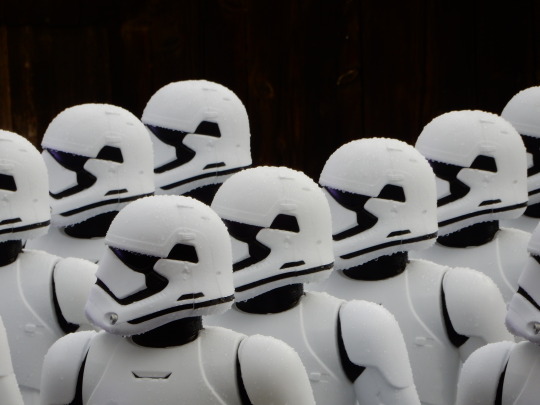

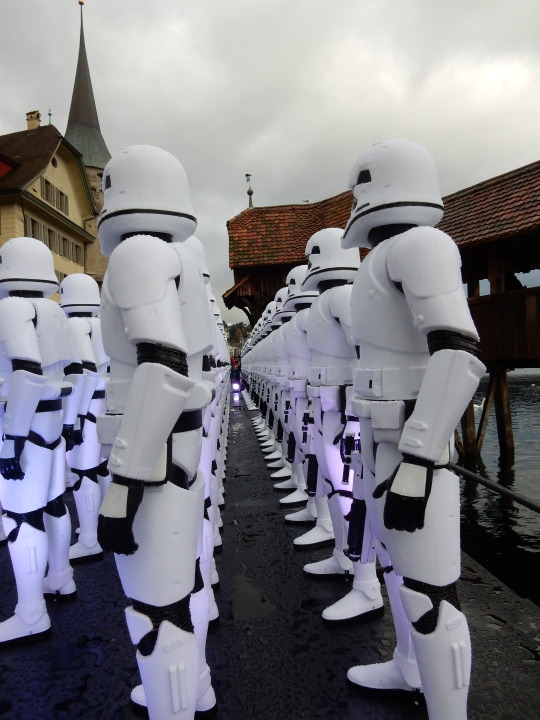
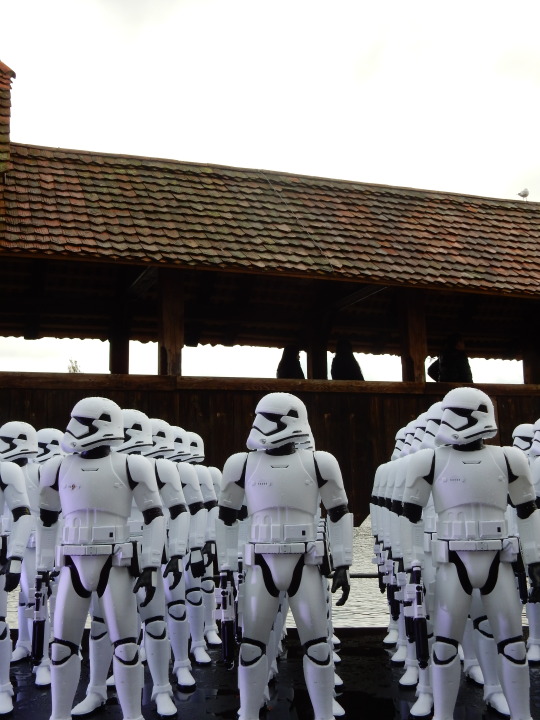
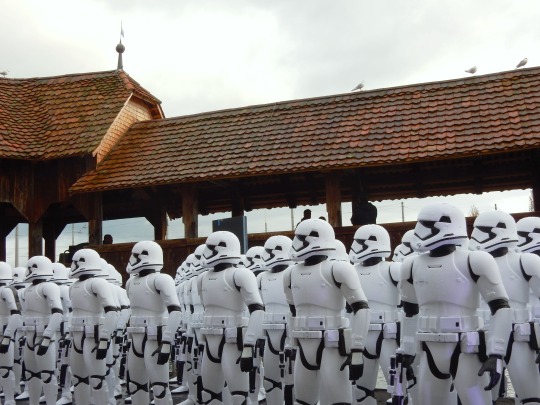

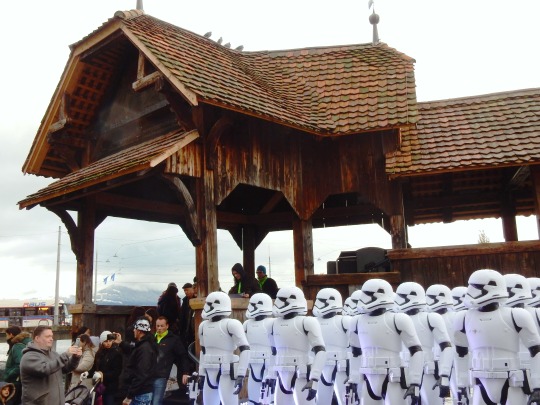


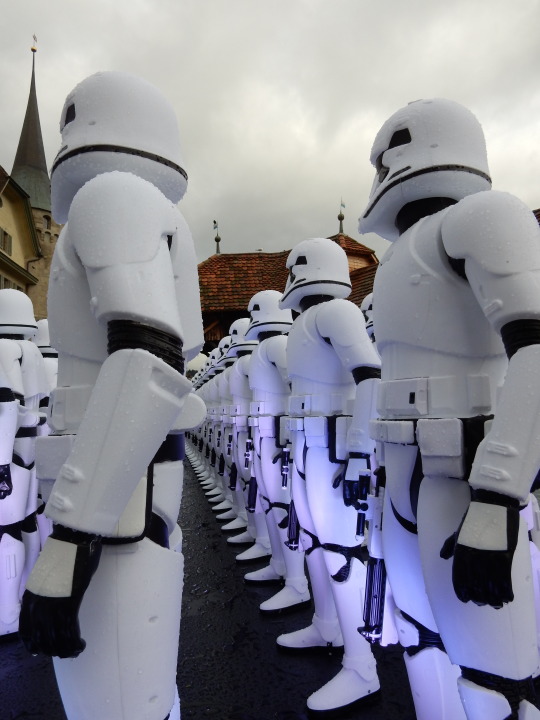
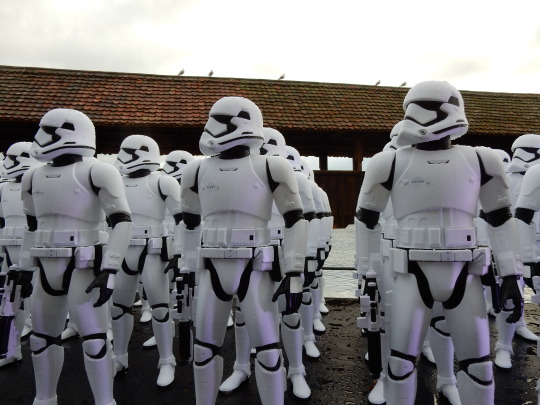
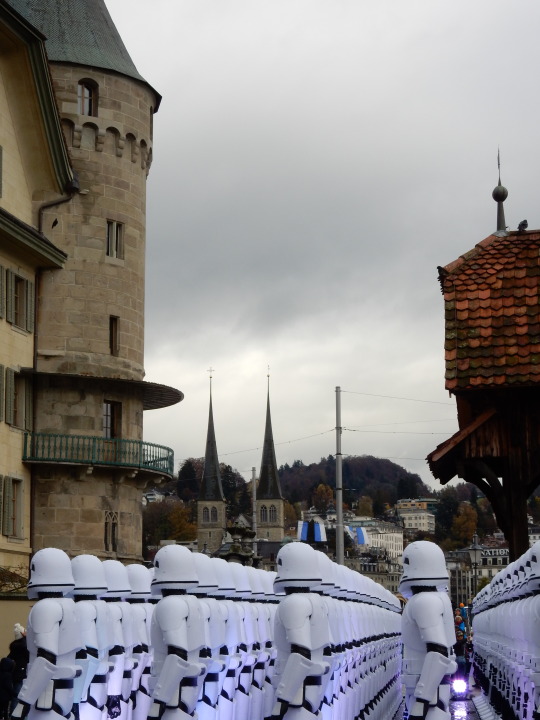

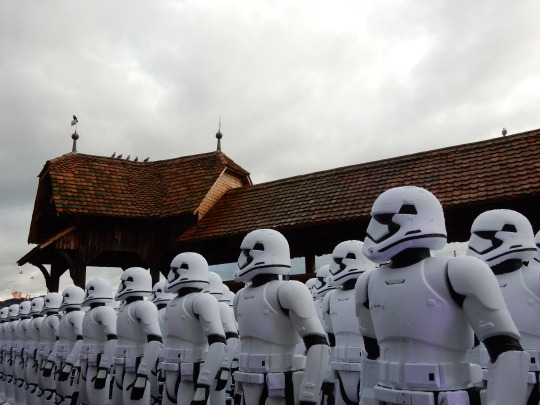

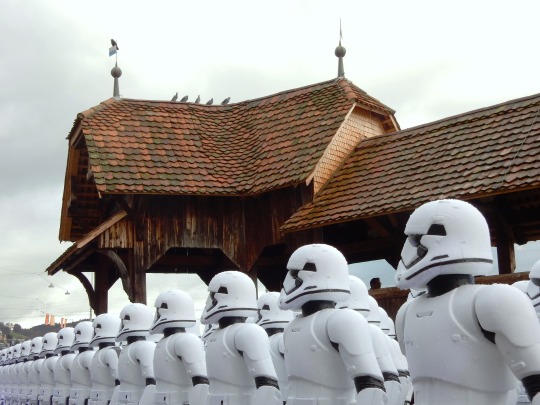

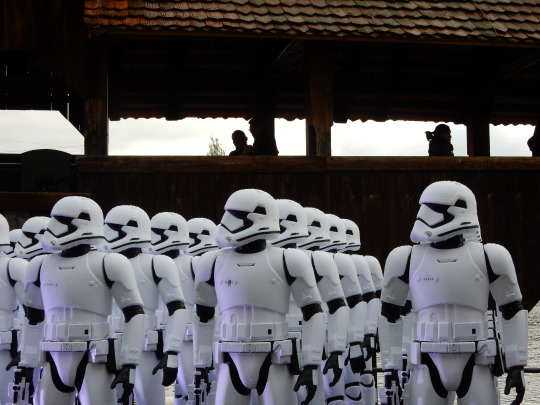
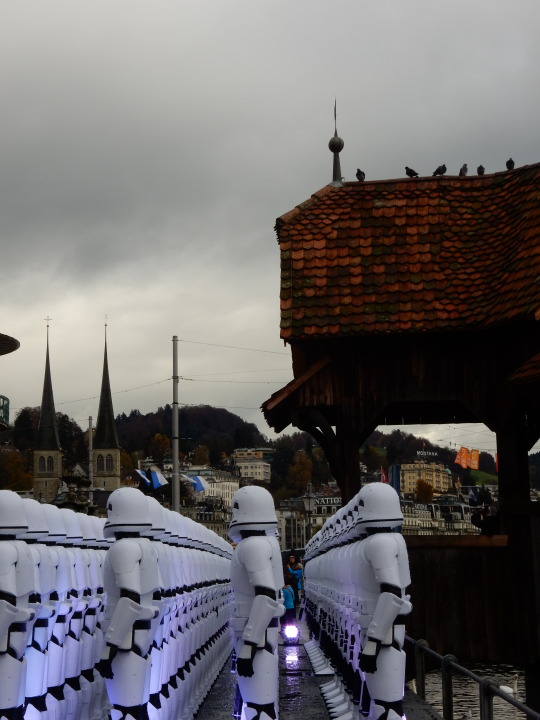
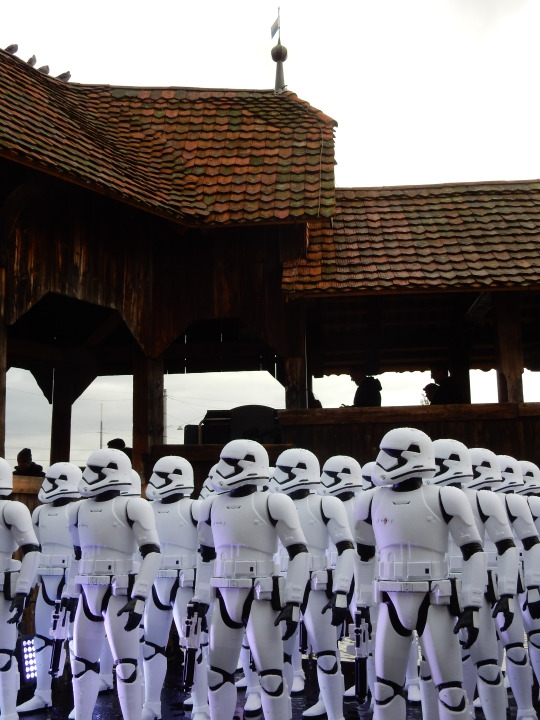
Star Wars Day
May the Fourth be with you. Fans of George Lucas’ iconic global phenomenon get to geek out extra hard on this pun-centric, nerd-friendly holiday.
May 4th has become commonly known as Star Wars Day, or National Star Wars Day. And who could be surprised? The words, “May the 4th” seem to beg for the rest of the catchphrase to be uttered.
Regardless of whether you prefer Star Wars or Star Trek, or if you are even a sci-fi aficionado at all, the influence of George Lucas’ Star Wars on pop culture is undeniable.
It seems that George Lucas had a knack of being able to connect with people in ways that others just could not, let’s face it, is there really a piece of work this man is responsible for that we cannot affix a quote to somewhere?
The truth is, Star Wars day represents more than just a quote in a film, the day itself is internationally recognized and is now as much a part of life as some of the most popular holidays you can name, we just have to ask ourselves why this is.
Well, if there is one thing we know for sure, it’s that it started out as a homage to something quite brilliant and, in its infancy, belonged only to the inner circles. As time went on, however, it reached more people and gained traction.
When we think of Star Wars day now, it’s not only a day, it’s something fun, and it’s also an in-joke that pretty much everybody on earth is a part of. While it may sound silly, something as incredibly simple as Star Wars Day has played a huge part in bringing people together no matter what background they are from.
The question of how this happened is all in the history, and the history of Star Wars Day is something that we are going to explore a little now.
The History of Star Wars Day
Star Wars, an epic space opera written and directed by George Lucas, premiered in 1977 and became an almost instant cult classic. Even today, almost 40 years later, Star Wars remains one of the most financially successful films of all time.
The franchise it began remains the most successful one of all time, earning over 2.5 billion dollars since the release of the first film. However, the money it’s earned over the years is hardly the most impressive aspect of Star Wars.
As famous film critic Roger Ebert put it: “Like The Birth of a Nation and Citizen Kane, Star Wars was a technical watershed that influenced many of the movies that came after.”
Star Wars was a real game-changer, beginning a new era of special effect-packed motion pictures bursting with excitement, adventure, and imagination that appealed enormously to younger audiences as well as older ones.
Many of today’s most acclaimed film directors, such as Peter Jackson, Ridley Scott, Christopher Nolan and James Cameron, cite Star Wars as a great influence on their careers.
Star Wars has also had an enormous cultural impact on other areas besides filmmaking, including politics–the Reagan Administration’s Strategic Defense Program was mockingly nicknamed “Star Wars.”
As recently as 2013, President Barack Obama used the phrase “Jedi mind meld” to describe what some people were expecting him to do in his opposition to make them accept his ideas.
“May the Fourth be with you” was first used by Margaret Thatcher’s political party to congratulate her on her election on May 4th, 1979, and the saying quickly caught on.
However, the first celebration of May 4th took place much later, at the Toronto Underground Cinema in 2001. This first official Star Wars Day’s festivities included a costume contest and a movie marathon. Fans’ favorite parodies of the franchise were also enjoyed, as were some of the most popular mash-ups and remixes.
While for some people, there may have been a fleeting thought that Star Wars Day was nothing but a fad that would die out, regardless of the fact the films never did, in swoop Disney, and they restarted the whole thing off and took it to a whole new level.
In 2015, Star Wars saw a new saga come and with all the charm, class and lens flares that Disney could throw at it, and wow did it reignite a fire in Star Wars fans, and we know that lighting that fire again was tough after what JarJar Binks did to it.
Of course, the fire restarted with the Force Awakens, and the new saga promised to deliver fans everything they wanted from a 21st century Star Wars sage. Surprisingly, this time around, Disney really delivered and did what they did best, they took a franchise and made it incredible again.
With Disney behind it and a few familiar faces returning, Star Wars Day was soon to become something even more special to a whole new demographic. Now, a whole new set of parents have to explain why even though it’s set a long, long time ago, things are way more advanced than they are now.
It seems that over the last five years, Star Wars has reached millions of new soon to be Jedi warriors, and if we know anything about Disney, we know they are going to make sure that this franchise is never left to rest again.
Since its revamp, National Star Wars Day has gained so much more popularity and is celebrated by Star Wars fans worldwide, and before long, we expect Disney to declare May 4th to be a national holiday.
Star Wars Day Timeline
1976 First Star Wars book is released
Although technically published before the release of the film in 1977, the book is actually written by George Lucas after he has already written the Star Wars screenplay.
1977 First Star Wars film is released
The first in a trilogy, Star Wars: A New Hope, is well-received by critics for the most part and grosses over $550 million at the box office on its first run.
2008 Luke Skywalker Day groups appear
Perhaps considered the predecessor to Star Wars Day, groups on Facebook start popping up using the catchphrase “May the Fourth be with you”.
2011 First Star Wars Day is celebrated
The first celebration of Star Wars Day in an organized fashion takes place in Toronto, Ontario, Canada on May 4 of this year. It includes film screenings, costume contests, parodies and more.
2015 Star Wars is watched in space
In celebration of Star Wars Day, the crew on the International Space Station watch the films.
How to celebrate Star Wars Day
The way you celebrate Star Wars day will depend on how well you know this cultural phenomenon. If you are a longtime fan of the franchise, you might want to get a group of friends together and attend one of the many Star Wars events organized in different parts of the world.
Such events range from costume contests to museum exhibits to tours of space centers. And if you’re not feeling up to going out, there’s no reason why a Star Wars Day party organized by you at home should be any less fun.
Movie marathons with friends, Star Wars trivia games, and even Star Wars themed snacks (Death Star piñata, anyone?) will guarantee this day is full of fun as well as being very educational.
“Vadering” another person has also become an extremely popular thing to do on this day, and the photos you take of this are sure to bring a smile to your face for years to come.
Because Star Wars itself is such an enormous topic, the ways of celebrating the day dedicated to it are virtually endless. So choose one, have fun, and May the 4th be with you!
Source
#R2 D2#Star Wars Day#StarWarsDay#May the 4th be with you#Stormtropper#Lucerne#Luzern#Switzerland#original photography#Kapellbrücke#Schweiz#Chapel Bridge#Zurgilgen Haus#downtown#movie#film#cityscape#architecture#landmark#tourist attraction#4 May#travel#vacation#Manhattan#New York City#USA#NationalStarWarsDay#May the Fourth be with you#May the Force be with you#Stormtrooper
2 notes
·
View notes
Note
I remember being introduced to the concept of ethnic cleansing unknowingly thanks to a Danny phantom fic. I remember I thought it was one of the most cruel and merciless things that could be done to someone, the helplessness and anger I felt when I finished reading was overwhelming, however, I consoled myself a little with the fact that it was a dystopia and did not happen in real life. Until I found out that it did happen in real life, and the way it affected a massive amount of indigenous communities that to this day is recognized as genocide, left me in shock.
The thought of being stripped of your identity, your culture, your family, while you see that the people responsible are quietly sitting back because they think they are doing you a favor, while insulting your roots, is enough to make you scream until your throat bleeds. It is truly a horror story.
If that's Draxxum's plan, then I don't think any punishment planned for him would be enough. The minimum i would ask, Whatever happens to him, let him know that he brought it on himself.
PD: i think is made clear that Donnie will not recover his memories before the war begin, And that when he does, the realization of the consequences of what he has done will be devastating. Almost enough to fill an entire arc😉?
What is WITH Danny Phantom and fucked up fan content? Seriously, the most horrifying, fucked up shit I've found has been in the Danny Phantom and the Yugioh fandoms-and the Yugioh fanworks were mostly just horny in really weird directions. Growing up I assumed that it was just the general age of the Phandom, that we were just at that point where we started becoming aware of the fucked up shit around us and were using fanfic and fanart to explore it. Which was definitely at least partially the case, but holy shit. Other cartoon fandoms generally don't have a vivisection genre. I don't know what it is about that show that brings this shit out in us. (I say this with love and affection-I have loved that show for almost twenty years)
I can't really say I recommend it, because it's not a book you enjoy reading, but I had to read First They Killed My Father a few years ago for a class, which is a first-hand account of a child during the Cambodian Genocide. I physically could not eat while I read this. I had no appetite. I'd have to put the book down and go do something else for a while before I could think about food. I generally consider myself a pretty stoic, hardened person when it comes to that kind of stuff-I recognize that it's horrible and feel bad, but it doesn't really upset me, if that makes sense. I remember reading one article about the Khmer Rouge that mentioned a specific tree they would use to kill infants-yeah, that is one of the only times I've ever had to say "I mentally cannot handle finishing this" and closed the tab.
The author describes being recruited as a child soldier and being told that they're the pride of the Khmer Rouge and that Pol Pot loves all his children. She's sitting there and remembering the people who starved to death in her original work camp while they loaded up food onto trucks to be sold internationally. Parents pleading with soldiers for more food because their children were actively starving. Being told "we only need two million people for our perfect society. We don't need them." It's a kind of rage and despair that you don't totally understand how to feel because it's not your own.
Like so many other things that Draxum does, it's a bit different because he's been there. His people were attacked because they were Yokai. His culture wasn't actively suppressed, but the Hidden City was so big and so few of his people made it there in the first place that most of their practices and traditions were replaced or simply died. No one speaks the Nordic language he grew up speaking. And he's not the kind of villain that just wants to make everyone suffer because he did. He's very aware that what he's doing is wrong-he just thinks that it's better than the alternatives.
Oh. Oh man. I have plans for Donnie. And yes, you should read that with an air of foreboding.
#are my sentences making sense? i feel like my wording is off today#i'm totally sober this time#doth#doth asks#baron draxum
18 notes
·
View notes
Note
hi! first of all, love you blog and your artwork is wonderful! secondly, i don't really have anyone to discuss this with, so i thought, i might as well bother a stranger on the internet. i recently came across dmitry orlov, a russian-american analyst-writer-blogger. while i disagree with him on a lot of things, he has rather sharp humor (the title of this post alone sure is something) and a strong conviction that the us is going to collapse a-la the soviet union, probably even worse. such predictions are usually met with an eye-roll, and i made a "pfft" sound and rolled my eyes as well. but then i come across an article stating that 50% of the respondents in the us expect no less than a civil war (!) in just a few years. where did this come from? is it just uber-maga people or what? along with other things, this type of info makes me scratch my head. what do you think?
thank you so much for the kind words and this ask @haissitall! i'm always open to messages and questions, though I can be a little spotty when it comes to answering sometimes. i'm unfamiliar with dmitry orlov but what i'm seeing of his work is very interesting so i'll try to backread some of his articles and keep up with his work going forward.
i found his article where he outlines the indications that the US is close to collapse and agree with them completely. the one i found was published in 2018 too, before the ukraine proxy war and the economic devastation and political polarization that exploded during COVID had even happened yet. i don't make the claim that i'm a geopolitical or economic expert by any stretch, but from my sort of above average level of understanding i think the US is absolutely in a state of free fall that i can't see taking much longer than another couple of years or so to really become fully apparent domestically. i'm going to put this reply under a cut because it ended up being pretty long. sorry for the text wall, this is just something i've wanted to put into words for a while now and you gave me an excuse to do so lol
so. the US dollar has been, up until recently, the world's reserve currency, meaning that much of international trade is reliant on a country having large amounts of US dollars in order to buy and sell goods internationally. from what i understand, this means that the US can leverage predatory loans against the global south via the IMF, whose terms entail that they agree to devastating economic austerity measures and buyouts of their national industries if they're to survive. this means that the US can plunder these countries for its own financial gain while also outsourcing domestic labor for a fraction of the cost. as a result of the US's heavily financialized imperialist economy, industry (and the skilled labor jobs that accompany it) have largely left the country, and our domestic economy now revolves around finance
to put that another way, americans that used to benefit from well-paying industrial jobs found themselves growing rapidly poorer as the reagan era delivered the death blow to labor unions and the subsequent flight of american industry to the global south made the domestic economy increasingly reliant on jobs in disposable, low-paying unskilled labor positions in the service industries, tech, and non-productive professional-managerial positions like doctors, office workers, and teachers. this means that the US working class had less economic power over the means of production, effectively crushing most of the working class's leverage to demand reforms or wage revolution against the ruling class of capitalists who derive their income from finance
this new, defanged working class is entirely dependent on the ruling class for their day to day survival. the cost of living is dramatically disproportionate to the income of most american families, so in order to pay for things like houses, cars, healthcare, education, and various day to day expenses, we have to take on predatory loans with high interest rates. this, in turn, allows the big banks to extract much of the meager wealth earned by the working class in order to enrich themselves exponentially. due to the endlessly greedy nature of capitalism, every year the working class grows poorer and more disenfranchised as the cost of living increases and the ruling class devises new ways to squeeze pennies out of people who are already largely a missed paycheck or two away from not being able to pay their bills
part of this form of capitalism's leverage over the working class is what's referred to in marxism as the reserve army of the unemployed-- this is a pool of unemployed workers that can be selected from at the ruling class's leisure in order to quickly fill vacancies in these poorly paying unskilled or low-skilled job positions. when workers are easily replaceable they'll do whatever they can to hold onto employment even if it means tolerating poor working conditions, low pay, and insufficient benefits. homelessness and incarceration is the implicit threat that keeps this neo-feudalist engine oiled and the people obedient
when a large proportion of the population is poor and the standard of living declines every year for people of the so-called middle classes, you naturally have a lot social instability that emerges. which is where the culture war comes in. i don't think it's a coincidence that the race to more deeply distinguish the cultural ideologies of the republican and democratic parties coincided with american de-industrialization. the ruling class needed to create a sort of good cop-bad cop dynamic for the people to project their angst onto. if you're a democrat, you're expected to blame the republicans for your ever-increasing misfortune, and the inverse is true of republicans. they advance intentionally divisive and increasingly drastic cultural positions that are guaranteed to repel a certain target subsection of the population while pairing that position to the core belief system of another subsection of the population. races are decided by where politicians stand on cultural issues such as abortion or gun rights, and while those issues are of course relevant to public consideration, both parties are united in advancing the economic interests of the imperial rent-extracting finance capitalists that fund their campaigns in relatively equal measure, depending on who is currently in power
there's a strong incentive to deepen the culture war every year, because the same messaging doesn't work forever. they have to create new fronts and inflame rhetoric more and more in order to hold peoples' interests. as a result, you end up with a population that's extremely individualistic, highly ideological, and loaded with contempt for other people within their class. they're so busy calling the other side fascist that they fail to realize that they're already living in a fascist country that's upheld by neo-feudalist and neo-colonial rent extraction policies as well as non-stop war and political interference abroad. in congress, neither side is able to concede to one another or agree on anything of substance so the only thing that really gets passed is funding for the US war machine
this is the domestic context the US is working with at the same time it started to realize that new economic rivals to its hegemony were starting to emerge. china in particular is set to surpass the US as the wealthiest country on earth within five years or so because of the unprecedented buildup of their productive industrial capacity that the US itself invested in because of the immediate promise of cheap outsourced labor. russia is a massive oil-producer with enough oil supply to easily provide europe with an alternative to more expensive US-owned oil, which was the purpose of the now-destroyed nordstream pipelines. iran is rich in a number of resources including oil and natural gas and serves as a military counter-balance to US domination over the middle east
the US, being almost completely de-industrialized and totally reliant on extraction from its imperial subjects in the global south for its industrial production, absolutely 100% can not under any circumstances tolerate the existence of a competitor to its highly aggressive foreign trade strategy. china and russia aren't without fault of course, but they've historically engaged in relatively straightforward, equitable trade with the leadership of the global south. they bring in affordable commodities while investing heavily in local infrastructure in order to increase domestic industrial capacity by providing them with resources and education on how to build and maintain their own factories and railways. they also don't meddle in their political affairs with assassinations and media manipulation, impose unpayable debt on developing nations, or use the threat of military intervention to coerce them into unfair trade deals. russia even helped syria, a key russian trade partner, militarily fight off US-backed forces seeking to overthrow its government, which would have happened were it not for their assistance
in the 20th century the US employed a divide and conquer strategy to pit the soviet union and china against one another to prevent them from forming a bloc, but by targeting russia, china, and iran all at the same time, they've catapulted all three into an iron-clad alliance that the US has no way of disrupting. the supremacy of the US dollar is falling rapidly as the neocons that run our foreign policy realize that they underestimated russia's economic resilience that comes with being an industrial power. the sanctions they imposed after goading russia into a military intervention in ukraine only hastened the emergence of a new multipolar world order that is already serving as a far more attractive counterbalance to the mafia-style US-led international order
i was utterly shocked by how little time it took for one-time US lapdogs turkey, india, and saudi arabia to start jumping ship and turning toward the eurasian axis. the EU and NATO states (aside from Turkey) have proven themselves to be total puppets to the interests that rule the US empire and are voluntarily de-industrializing themselves by cutting themselves off from russian oil all at once, and de-militarizing themselves all at once by sending all of their military infrastructure to ukraine to be blown up by the russian military. this is utterly catastrophic for the US. the global south is oriented more and more toward the russia-china-iran axis the longer the US drags out this unwinnable proxy war that it paradoxically can't afford to lose
europe is going to collapse without the russian oil needed to keep its industry and the US will be close behind. the US empire's capacity to maintain the hundreds of expensive military bases that pepper the globe will decrease dramatically when it can no longer rely on a constant inflow of imperial rents from a newly industrializing global south. the eurasian and eurasian-aligned countries will benefit from cheap and abundant energy while the european and american people will face a full scale economic disaster. people will freeze to death in winter, lose their houses and life savings, struggle with rampant food shortages. i feel like the US will probably try to re-industrialize, it seems like biden's nodding in that direction, but it would be impossible to do so in time for a collapse that in my largely uneducated opinion will probably be here in the next three to four years, if that, given how already pushed to their limits the people were at the start of this thing. no idea what happens from there. it'll be a total fucking nightmare but will ultimately, in my view, precipitate the re-industrialization and gradual socialist development of the west. i'm not looking forward to it but it needs to happen, the US empire is well beyond its expiration date and the slaughter has to end
if you'd like to read more about this from people i keep up with, i'd start with michael hudson and garland nixon. the above is a poor articulation of their analysis along with various others, so if you want to get it from the source, i'd start with them. i remember being profoundly impacted by this piece by michael hudson when i was still getting my bearings re: the ukraine proxy war, i think it's a good jumping off point
7 notes
·
View notes
Text
The Death of Kissinger
Let the news of the death of the all-powerful Secretary of State Henry Kissinger, aged 100, catch you in a college class where filmmaker Oliver Stone is dissecting some of the state crimes committed with his blessing over the century. It is one of those journalistic lucks that you only get when you work for them.
Last week we were at the home of history teacher Peter Kuznick to talk about the 60th anniversary of the assassination of John Fitzgerald Kennedy. On the table was a book The Untold History of the United States, written with Oliver Stone.
He told us that every semester, after Thanksgiving Day, Stone takes part in one of his classes so students can ask him whatever they want about his films and documentaries. He uses those films to review some of the most traumatic episodes in recent American history. Would you like to come? he asked. Of course.
It is a night class , almost clandestine in the parameters of the American schedule: it starts at half past nine in the evening and ends at eleven at night.
Stone gets there by dragging his feet a little, his 77 years and the effort to smile from time to time evident. "The title of this class should be LIES. That's my obsession, the lies that have sustained many of the military actions that this country of ours has sponsored. This obsession to arm countries, to have interests everywhere, to be permanently involved in wars. It seems to be our leitmotif, always at war - far or near."
There are students of history, education or journalism. They ask him about his experience in Vietnam, about who killed Kennedy, about his parents' divorce or about his "less" political-historical films, such as Natural Born Killers or The Doors.
He doesn't always answer what he is asked. At first, because he is a little deaf and finds it difficult to catch them. And then - this is just my speculation - because he decides what he wants to talk about .
And lately he likes to talk about nuclear energy as a tool to fight climate change (he just released a documentary on the subject, Nuclear Now) and what he sees as America's sick obsession with Russia. "We should be cooperating with Russia, and with China and with Iran. All this militarization, this division, it makes no sense. It is possible to cooperate [internationally]. There is no reason not to, beyond the ideological."
A journalism student stands up to tell him that 15 minutes ago it became known that Henry Kissinger, who was secretary of state and political adviser, formally or informally, to almost every president of the United States from JFK to the present, died at 100 years old.
"Is Kissinger dead? What a great role Paul Sorvino played in the movie we made in 1995 [Nixon]… Well, he was Nixon's guardian angel. It might even seem like he commanded more than the president...and he doesn't give a shit? They gave him a Nobel Peace Prize! Nixon wanted to bomb Cambodia. Kissinger made it possible. The killing was the same. He may not have realized it, but he would've served the Nazi regime, probably, back in the day."
Oliver Stone does not raise his voice much, but he is comfortable in excess and provocation. Professor Kuznick shrinks a little next to him. "Maybe not in the Nazi regime, but it is clear that he acted without any morality."
Up to four times, Stone directs his criticism at the mainstream media and accuses them of always rowing in favor of the government's theses, and hiding shame under the rug.
He does not feel that he has to prove that with any evidence, which, on the other hand, he does want when someone tells him that maybe Putin has something to do with the death of the leader of the Wagner group, or when he says that he has not seen anything that prove that Joe Biden won the last election.
These are statements that he has made these days while promoting, in conventional media as well, his latest documentary. This is the cinematographic genius who has been able to capture and portray -like few others - the traumas of a country he says he loves, but which he has not fully understood for a long time. He who walks the fine line that separates skepticism and critical distancing from the sources official conspiracy theories.
We wanted to ask him how he manages not to cross the line, or if he thinks he's ever crossed it But we couldn't. He leaves the class tired and - I'd say - a little fed up, and dismisses us very quickly. The teacher who had invited us there takes pity on us and summarizes what part of the history of the United States they maintain is not explained: "That of the dominant empire. That - of this empire with hundreds of bases everywhere, of billions of dollars dedicated to the military - that of its more than 200 years of existence, it's always at war. We talk about other people being aggressive and doing terrible things, and we don't look at ourselves."
The journalism student asks him for one final piece of advice, and Oliver Stone seems to give it straight: Don't get too close to the big fish or power. Try to get into the system and try to do as well as you can within it. To that we say, amen.
-Lidia Heredia, "Kissinger, Oliver Stone and a history and film class," 3Cat, Dec 23 2023 [translated from original]
Video at link.
#oliver stone#henry kissinger#peter kuznick#untold history of the united states#class#american university
0 notes
Text



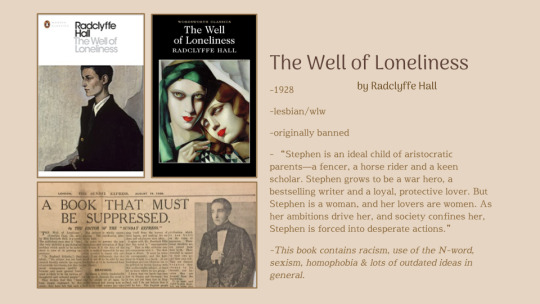
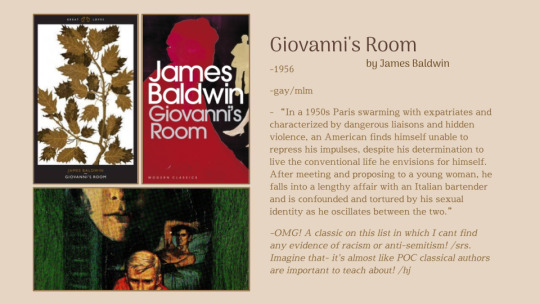





queer classic book recs!!
Image description under the cut! Please tell me if I did something wrong and I will gladly change it!
The other recs will be in the reblog!
[Each slide excluding the title screen includes 3 photos relating to the book, largely alternative covers of each in a small grid format.]
Slide One: In the center is a box with interior text reading "13 lgbtq classics and 1 “modern” classic. Recs in the comments welcome!" The top left corner includes an image of a calligraphy quill. Underneath this is text that reads "Disclaimer! The beginning of this list is.. Very White, but don't worry it gets more diverse as the books get more recent!!" In the top right corner is a text box reading "Look up trigger warnings or I’ll steal your gender! … or give it back!!" under this is a picture of an open book displayed in the foreground and another stack of books in the background.
Slide Two: Carmilla by J. Sheridan Le Fanu.
1872
Lesbian/wlw but written by a man
vampires!
“Following a near-fatal carriage collision, the beautiful young Carmilla is taken in by the narrator Laura and her father.”
While this book plays into the stereotype of the “monteress, seductive lesbian,” it is one of the oldest and most famous classical texts depicting a lesbian relationship. Toxic AF.
Slide Three: The Picture of Dorian Gray by Oscar Wilde
1890
not explicitly queer (subtext)
but gay (mlm) tho
“Enthralled by his own exquisite portrait, Dorian Gray exchanges his soul for eternal youth and beauty. Influenced by his friend Lord Henry Wotton, he is drawn into a corrupt double life, indulging his desires in secret while remaining a gentleman in the eyes of polite society. Only his portrait bears the traces of his decadence.”
This book contains Anti-semitism, Racism, Sexism and is honestly a product of its time. Oscar Wilde is certainly a character.
Slide Four: Orlando by Virginia Woolf
1928
sapphic/gender exploration
“The novel opens as Orlando, a young nobleman in Elizabeth's England, awaits a visit from the Queen and traces his experience with first love as England under James I lies locked in the embrace of the Great Frost.”
Main Character is racist and anti-Semitic. While her writing is incredibly important and impactful as a queer figure, she will always be white before she is queer.
Slide Five: The Well of Loneliness by Radclyffe Hall
1928
lesbian/wlw
originally banned
“Stephen is an ideal child of aristocratic parents—a fencer, a horse rider, and a keen scholar. Stephen grows to be a war hero, a bestselling writer, and a loyal, protective lover. But Stephen is a woman, and her lovers are women. As her ambitions drive her, and society confines her, Stephen is forced into desperate actions.”
This book contains racism, use of the N-word, sexism, homophobia & lots of outdated ideas in general.
Slide Six: Giovanni's Room by James Baldwin
1956
gay/mlm
“In a 1950s Paris swarming with expatriates and characterized by dangerous liaisons and hidden violence, an American finds himself unable to repress his impulses, despite his determination to live the conventional life he envisions for himself. After meeting and proposing to a young woman, he falls into a lengthy affair with an Italian bartender and is confounded and tortured by his sexual identity as he oscillates between the two.”
OMG! A classic on this list in which I can't find any evidence of racism or antisemitism! /srs. Imagine that- it's almost like POC classical authors are important to teach about! /hj
Slide Seven: Maurice by E.M. Forster
1971
gay/mlm
fluffy, but homophobia exists in the story as well.
“Maurice is heartbroken over unrequited love, which opened his heart and mind to his own sexual identity. In order to be true to himself, he goes against the grain of society’s often unspoken rules of class, wealth, and politics.”
This book contains the use of the g slur. Please tell me if I missed something!
Slide Eight: HERmione by H.D.
1981
queer/sapphic woman author
poetry
so mf sad bro I mean look at that blurb
“An interior self-portrait of the poet H.D. (1886-1961) is what can best be described as a 'find', a posthumous treasure. ‘I am Hermione Gart, a failure' -she cried in her dementia, 'I am Her, Her, Her.”
To my knowledge, this book isn't problematic- please tell me if it is though!!
Slide Nine: Zami: A New Spelling of My Name by Audre Lorde
1982
lesbian/wlw
A staple of lesbian lit from before the peak of an activist’s career. Great read.
“From the author's vivid childhood memories in Harlem to her coming of age in the late 1950s, the nature of Audre Lorde's work is cyclical. It especially relates the linkage of women who have shaped her.”
Once again to my knowledge, this book isn't problematic
Slide Ten: The Color Purple by Alice Walker
1982
features queer women
has a movie adaptation!
“Separated as girls, sisters Celie and Nettie sustain their loyalty to and hope in each other across time, distance, and silence. Through a series of letters spanning twenty years, first from Celie to God, then the sisters to each other despite the unknown, the novel draws readers into its rich and memorable portrayals of Celie, Nettie, Shug Avery, and Sofia and their experience.”
Once again to my knowledge, this book isn't problematic
Slide Eleven: Oranges Are Not the Only Fruit by Jeanette Winterson
1985
lesbian/wlw
“This is the story of Jeanette, adopted and brought up by her mother as one of God's elect. Zealous and passionate, she seems destined for life as a missionary, but then she falls for one of her converts. At sixteen, Jeanette decides to leave the church, her home, and her family, for the young woman she loves. Innovative, punchy, and tender.”
Once again to my knowledge, this book isn't problematic- but warning, there are quite heavy themes!
Slide Twelve: Dykes to Watch Out For by Alison Bechdel
1986
lesbian/wlw
a classic comedy comic + a really good insight & look into lesbian culture
“Grin, giggle, and guffaw your way through this celebrated cartoonist's graphic commentary of contemporary lesbian life.”
Once again to my knowledge, this book isn't problematic*
*contains d-slur used by lesbians in a non-offensive way
Slide Thirteen: Stone Butch Blues by Leslie Feinberg
1993
lesbian/gender identity around lesbianism
“Woman or man? This internationally acclaimed novel looks at the world through the eyes of Jess Goldberg, a masculine girl growing up in the "Ozzie and Harriet" McCarthy era and coming out as a young butch lesbian in the pre-Stonewall gay drag bars of a blue-collar town. Stone Butch Blues traces a propulsive journey, powerfully evoking history and politics while portraying an extraordinary protagonist full of longing, vulnerability, and working-class grit.”
Once again to my knowledge, this book isn't problematic
Slide Fourteen: Tipping the Velvet by Sarah Waters
1998
lesbian/wlw
historical romance
“Nan King, an oyster girl, is captivated by the music hall phenomenon Kitty Butler, a male impersonator extraordinaire treading the boards in Canterbury. Through a friend at the box office, Nan manages to visit all her shows and finally meet her heroine. Soon after, she becomes Kitty's dresser, and the two head for the bright lights of Leicester Square where they begin a glittering career as music-hall stars in an all-singing and dancing double act. At the same time, behind closed doors, they admit their attraction to each other and their affair begins.”
Once again to my knowledge, this book isn't problematic
Slide Fifteen: Under the Udala Trees By Chinelo Okparanta
2015
lesbian/wlw
modern classic imo, look into the coexistence of native Nigerian culture & queerness
“Ijeoma comes of age as her nation does; born before independence, she is eleven when civil war breaks out in the young republic of Nigeria. Sent away to safety, she meets another displaced child, and they, star-crossed, fall in love. They are from different ethnic communities. They are also both girls. When their love is discovered, Ijeoma learns that she will have to hide this part of herself. But there is a cost to living inside a lie.”
Once again to my knowledge, this book isn't problematic
#queer books#lgbtq books#classic books#classic literature#lgbt books#book recommendation#classics#books#literature#poetry#lgbtq#queer#diverse books#diverse reads
46 notes
·
View notes
Text
Drinks in the Summerset Isles —Some Headcanons
Something I've been working on for a while now. As the title suggests, these are some HCs about drinks (types, when they're served, by whom, etc.) in the Summerset Isles. This is loosely based on ESO era Summerset but many of these HCs can be understood regardless.
Water
Water is the most basic staple drink in the Summerset Isles.
Despite the warm climate, the clouds stalled by Summerset's Eton Nir mountain provide the islands with a decent amount of rainfall. Rivers and springs are also an important source of freshwater.
The most famous spring in the Summerset Isles is located in Cloudrest; its water is said to have curative properties and attracts pilgrims from all over the Isles. The welkynar also use it in their rituals.
Although many cities in the Summerset Isles possess sewer systems, the water from rivers and lakes is still often polluted with muck and the poorest of the poor living in the cities' underbellies use it for pretty much everything from doing the laundry to washing to—well, you get it.
Desalination is a hot research topic at the College of Sapiarchs, but so far, it has only been achieved on a very small scale using distillation or Maormer tongues, which many sailors carry as an emergency item.
The houses of the rich have their own private wells and in case of the very rich, there are even systems (typically manually, mechanically or magically powered pumps) that allow for running water.
The common folk have to content themselves with public wells and cisterns, although the water from the latter is not always safe to drink. Many of the Isles' inhabitants know this and will switch to a different affordable staple.
Wine
Another common staple drink in the Summerset Isles is wine.
Although Summerset's most famous wines are sweet, heavy reds with a strong fruity flavour, it should be noted that the staple wines contain much less alcohol than their famed counterparts, because they stem from second and third pressings.
Wine is available to anyone, although poor folk have to content themselves with watered down swill or even wine-vinegar mixtures.
Rich altmer, on the other hand, have access to fine vintages that can be centuries old. Over the centuries, the altmer have perfected wine preservation, using both alchemical means and magic and collecting wine is a popular hobby among the Summerset Isles' rich and noble.
Rosé, orange and white wines are less common than their red brethren, but especially on hot summer days, they enjoy immense popularity and are often mixed with iced water.
Hot mulled wine is a favourite during storm season, and many a sailor gets their fill at the harbourside inns, though it's also served in non-port cities, albeit to a lesser extent.
Fruit wines, as well as cider, are not commonly produced in the Summerset Isles, however, they are a popular import.
Beer
Beer, as well as ale, are often scoffed at as a "drink for humans" and were, for the longest time, not produced in the Isles at all. Only a few taverns in the busy port towns actually served it. With the opening of Summerset to outsiders, a few ambitious entrepreneurs saw an opportunity and opened the first Summerset Isles brewery in the busy port town of Vukhel Guard. Soon, others would follow.
Beer is becoming more popular in the Isles among newcomers and the native population alike and the local variety, "Eagle's Tears", is even shipped internationally due to Dominion soldiers wanting their share.
Coffee
Coffee isn't cultivated in the Isles. Before the war, the beans were a favourite Hammerfell import among scholars because coffee was said to stimulate the mind. Summerset coffee was typically heavily sweetened; the strong aroma of Taneth Coffee was too much for the average altmeri palate. With the war, coffee imports have practically ceased and coffee consumption is frowned upon.
Teas & Infusions
The tea plant isn't native to the Summerset Isles and so far, any cultivation attempts have failed. The native Summerset teas are herbal infusions and typically only drunk for medicinal purposes.
However, true teas are popular among the rich and middle-class alike and there's a booming tea trade with Elsweyr, especially since Rooibos cultivation has been successful in Northern Elsweyr, opening an alternative to the war-stalled trade with Hammerfell and an additional alternative to the true teas of Southern Elsweyr.
Since the Establishment of the Dominion, there's been a growing black market for teas and plant infusions from Valenwood.
Juices
Despite the difficulty of preservation, freshly pressed juices are a popular drink in the Isles. In fact, no Altmeri breakfast is complete without some freshly squeezed juice.
The climate sets the perfect conditions for growing all kinds of fruit: oranges, peaches, lemons, grapes, figs—the list goes on and on.
Rich altmer will almost always have a variety of fruit trees in their gardens whereas lower and middle-class altmer buy their juice-fruits of choice at their local markets.
Many cities plant fruit carrying trees along the streets or in parks because they look beautiful when in bloom.
Once the trees carry fruits, people are encouraged to pluck their share before the fruits fall and stain the ground, allowing even the poorest of the poor some access to fruits and juice.
Spirits & Liquors
Although many altmer consider drunkenness improper and disgusting, the Summerset Isles are home to some of the best "hard" alcohol there is.
The altmer have a long history of distilling fruit brandy/spirits—though perhaps the most common spirit is pomace brandy in any and all variations—and have mastered the art of creating sweet fruit liquors, especially from wine (Thinking of something like the Croatian Teran liquor).
A common "stock alcohol" used as the basis for infused alcohol is brandy or, especially on Auridon, Korn (strong spirit made from grain).
Herbal spirits and liquors are less common, but they're a customary digestif and denying them once they've been served is an insult to the host. Best to declare one's abstinence beforehand.
Still, if you want to indulge in "hard" alcohol (anything containing a distilled alcohol), best find a local with a stash because taverns are ordered to limit the servings per person.
#elder scrolls#elder scrolls online#the elder scrolls#summerset#summerset isles#altmer#alcohol cw#alcohol#drinks#elder scrolls headcanon#ideas and headcanons
36 notes
·
View notes
Photo










Star Wars Day
May the Fourth be with you. Fans of George Lucas’ iconic global phenomenon get to geek out extra hard on this pun-centric, nerd-friendly holiday.
May 4th has become commonly known as Star Wars Day, or National Star Wars Day. And who could be surprised? The words, “May the 4th” seem to beg for the rest of the catchphrase to be uttered.
Regardless of whether you prefer Star Wars or Star Trek, or if you are even a sci-fi aficionado at all, the influence of George Lucas’ Star Wars on pop culture is undeniable.
It seems that George Lucas had a knack of being able to connect with people in ways that others just could not, let’s face it, is there really a piece of work this man is responsible for that we cannot affix a quote to somewhere?
The truth is, Star Wars day represents more than just a quote in a film, the day itself is internationally recognized and is now as much a part of life as some of the most popular holidays you can name, we just have to ask ourselves why this is.
Well, if there is one thing we know for sure, it’s that it started out as a homage to something quite brilliant and, in its infancy, belonged only to the inner circles. As time went on, however, it reached more people and gained traction.
When we think of Star Wars day now, it’s not only a day, it’s something fun, and it’s also an in-joke that pretty much everybody on earth is a part of. While it may sound silly, something as incredibly simple as Star Wars Day has played a huge part in bringing people together no matter what background they are from.
The question of how this happened is all in the history, and the history of Star Wars Day is something that we are going to explore a little now.
The History of Star Wars Day
Star Wars, an epic space opera written and directed by George Lucas, premiered in 1977 and became an almost instant cult classic. Even today, almost 40 years later, Star Wars remains one of the most financially successful films of all time.
The franchise it began remains the most successful one of all time, earning over 2.5 billion dollars since the release of the first film. However, the money it’s earned over the years is hardly the most impressive aspect of Star Wars.
As famous film critic Roger Ebert put it: “Like The Birth of a Nation and Citizen Kane, Star Wars was a technical watershed that influenced many of the movies that came after.”
Star Wars was a real game-changer, beginning a new era of special effect-packed motion pictures bursting with excitement, adventure, and imagination that appealed enormously to younger audiences as well as older ones.
Many of today’s most acclaimed film directors, such as Peter Jackson, Ridley Scott, Christopher Nolan and James Cameron, cite Star Wars as a great influence on their careers.
Star Wars has also had an enormous cultural impact on other areas besides filmmaking, including politics–the Reagan Administration’s Strategic Defense Program was mockingly nicknamed “Star Wars.”
As recently as 2013, President Barack Obama used the phrase “Jedi mind meld” to describe what some people were expecting him to do in his opposition to make them accept his ideas.
“May the Fourth be with you” was first used by Margaret Thatcher’s political party to congratulate her on her election on May 4th, 1979, and the saying quickly caught on.
However, the first celebration of May 4th took place much later, at the Toronto Underground Cinema in 2001. This first official Star Wars Day’s festivities included a costume contest and a movie marathon. Fans’ favorite parodies of the franchise were also enjoyed, as were some of the most popular mash-ups and remixes.
While for some people, there may have been a fleeting thought that Star Wars Day was nothing but a fad that would die out, regardless of the fact the films never did, in swoop Disney, and they restarted the whole thing off and took it to a whole new level.
In 2015, Star Wars saw a new saga come and with all the charm, class and lens flares that Disney could throw at it, and wow did it reignite a fire in Star Wars fans, and we know that lighting that fire again was tough after what JarJar Binks did to it.
Of course, the fire restarted with the Force Awakens, and the new saga promised to deliver fans everything they wanted from a 21st century Star Wars sage. Surprisingly, this time around, Disney really delivered and did what they did best, they took a franchise and made it incredible again.
With Disney behind it and a few familiar faces returning, Star Wars Day was soon to become something even more special to a whole new demographic. Now, a whole new set of parents have to explain why even though it’s set a long, long time ago, things are way more advanced than they are now.
It seems that over the last five years, Star Wars has reached millions of new soon to be Jedi warriors, and if we know anything about Disney, we know they are going to make sure that this franchise is never left to rest again.
Since its revamp, National Star Wars Day has gained so much more popularity and is celebrated by Star Wars fans worldwide, and before long, we expect Disney to declare May 4th to be a national holiday.
Star Wars Day Timeline
1976 First Star Wars book is released
Although technically published before the release of the film in 1977, the book is actually written by George Lucas after he has already written the Star Wars screenplay.
1977 First Star Wars film is released
The first in a trilogy, Star Wars: A New Hope, is well-received by critics for the most part and grosses over $550 million at the box office on its first run.
2008 Luke Skywalker Day groups appear
Perhaps considered the predecessor to Star Wars Day, groups on Facebook start popping up using the catchphrase “May the Fourth be with you”.
2011 First Star Wars Day is celebrated
The first celebration of Star Wars Day in an organized fashion takes place in Toronto, Ontario, Canada on May 4 of this year. It includes film screenings, costume contests, parodies and more.
2015 Star Wars is watched in space
In celebration of Star Wars Day, the crew on the International Space Station watch the films.
How to celebrate Star Wars Day
The way you celebrate Star Wars day will depend on how well you know this cultural phenomenon. If you are a longtime fan of the franchise, you might want to get a group of friends together and attend one of the many Star Wars events organized in different parts of the world.
Such events range from costume contests to museum exhibits to tours of space centers. And if you’re not feeling up to going out, there’s no reason why a Star Wars Day party organized by you at home should be any less fun.
Movie marathons with friends, Star Wars trivia games, and even Star Wars themed snacks (Death Star piñata, anyone?) will guarantee this day is full of fun as well as being very educational.
“Vadering” another person has also become an extremely popular thing to do on this day, and the photos you take of this are sure to bring a smile to your face for years to come.
Because Star Wars itself is such an enormous topic, the ways of celebrating the day dedicated to it are virtually endless. So choose one, have fun, and May the 4th be with you!
Star Wars Day FAQs
What is Star Wars Day?
This is a special day that was started to commemorate and celebrate all things related to the Star Wars Franchise that is now owned by Disney. It’s a day when Star Wars fans dress up in costumes, display memorabilia, watch films, attend parties and generally enjoy this sci-fi, pop-culture phenomenon.
Why is Star Wars Day on May 4?
The date of Star Wars Day has to do with the popular Jedi phrase from the films, “May the force be with you.” When this date is pronounced “May the Fourth”, it sounds similar, so it’s really just a fun play on words.
Is Star Wars Day a holiday?
While not officially designated a holiday by any government, Star Wars Day is an informal commemorative day that is celebrated on May 4 each year.
Who started Star Wars Day?
Although it may have sprung up out of a grassroots movement in the early 2000s, the official creator of Star Wars Day is none other than the creator and author of the original franchise, filmmaker George Lucas.
When was the first Star Wars Day?
The first organized Star Wars Day was celebrated in 2011 where many festivities took place at the Toronto Underground Cinema in Toronto, Canada.
Source
#R2 D2#Star Wars Day#May the Fourth be with you#4 May#Stormtrooper#May the force be with you#NationalStarWarsDay#New York City#Manhattan#original photography#Luzern#Lucerne#Kapellbrücke#Chapel Bridge#USA#Zurgilgen Haus#old town#architecture#ciyscape#Schweiz#Switzerland#travel#vacation#fall 2016#movie#film
0 notes
Text
In “Why We Lost the Sex Wars,” Bracewell suggests that the women’s-liberation movement could have retained its radical edge had it paid more attention to its Black and Third World participants. Feminists of color on both “sides” of the sex wars—Alice Walker, Patricia Hill Collins, Cherríe Moraga, Mirtha Quintanales—cautioned against using the power of the carceral state to address the pathologies of sex and imagined a form of sexual freedom based on the eradication of racism and imperialism. Today, activists readily agree that feminism must be “intersectional”—that is, alert to the complex ways in which the workings of patriarchy are inflected by race, class, and other axes of oppression. And yet intersectionality is often seen as a primarily domestic concern. In a recent conversation with Barbara Smith, one of the authors of the 1974 Combahee River Collective Statement, a founding document of intersectional feminism, the Black feminist Loretta J. Ross observed, “In the seventies and eighties and nineties we were much more transnational in our organizing than I am seeing today.”
“Direct, personal internationalism,” Sheila Rowbotham writes, “was very much part of sisterhood.” Her memoir describes visits to, and from, the women’s movements in Germany, Italy, Spain, Greece, and France; time spent poring over a friend’s notes on a Vietnamese women’s delegation; and research into the role of women in nationalist movements in Cuba and Algeria. In the United States, “Sisterhood Is Powerful,” the hugely popular 1970 anthology of writings from the American Women’s Liberation Movement, edited by Robin Morgan, was followed, in 1984, by the publication of “Sisterhood Is Global,” a collection of essays on the women’s movement in nearly seventy countries, each written by a feminist theorist or activist working on the ground.
Such internationalism has largely withered away in Anglo-American feminism. This no doubt has something to do with the broader demise of the international workers’ movement, with a general Anglo-American tendency toward insularity, and, perhaps, with the Internet, which has simultaneously given us too much to read and corroded our capacity to read it. These days, it can seem that, because feminism is so pervasive, so much on the best-seller lists and the syllabi and Twitter, we already know all about it. But there is, unsurprisingly, still much to learn. Shiori Itō’s “Black Box,” which appeared in English this year, is an arresting first-person account of a Japanese journalist’s attempt to secure justice after she was raped by a prominent TV personality. First published in Japan in 2017, “Black Box” has been central to the #MeToo movement there, laying bare how the country’s culture and history shape a specific regime of male sexual entitlement. It could be read instructively alongside Chanel Miller’s “Know My Name,” her 2019 memoir of being sexually assaulted by the Stanford student Brock Turner.
“Who Lost The Sex Wars?”
19 notes
·
View notes